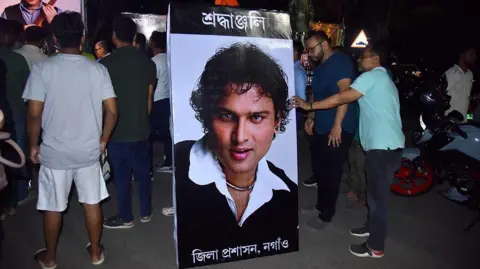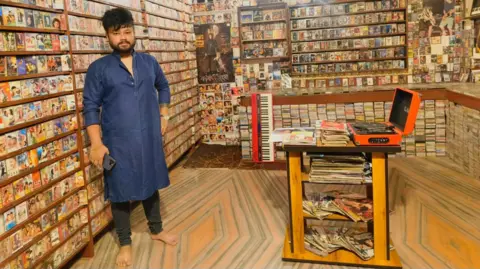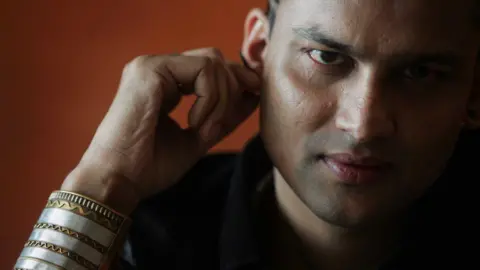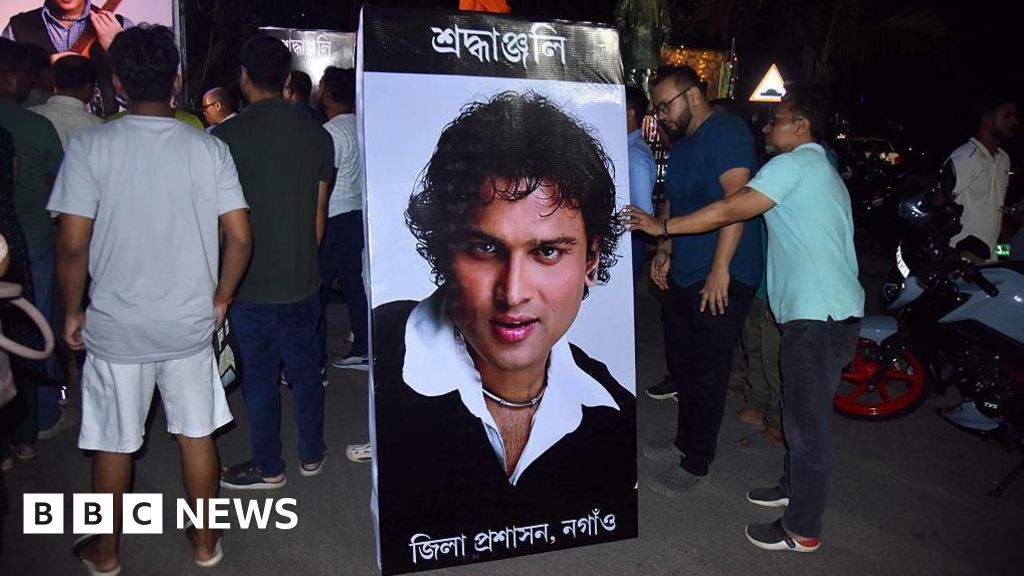Abhishek DeyBBC News, Guwahati
 Getty Images
Getty ImagesVishal Kalita’s collection of music cassettes has turned his residence in India’s Assam state into a private museum.
For more than a decade, the 30-year-old has been travelling across the country buying obsolete tapes, which he has carefully stored at his home in Guwahati city.
The collection, which was opened to the public last month, also includes hundreds of CDs and rare posters of musicians from around the world.
But it’s the discography of Zubeen Garg, a singer and composer from the state, that has been drawing the most number of visitors.
A cultural icon in Assam, Garg died in Singapore last month, leaving his millions of fans heartbroken.
Mr Kalita has some 38,000 songs of the singer in his collection, including songs that cannot be found anywhere else today, he says.
On 16 September, just days before his death, Garg had even visited Mr Kalita’s residence and said the collection reminded him of some of his “long-forgotten” creations.
Mr Kalita is now part of a larger network of Garg’s fans and friends who are trying to make his oeuvre more accessible through online streaming platforms and ensure royalties for his family.
“Some of these cassettes are too old and can get damaged. I want to bring them back to public memory,” he says.
But can he do it?
Many of Garg’s songs cannot be uploaded online without risking copyright violation owing to a lack of clarity over their ownership, which is scattered among a complicated network of producers, distributors and music labels.
It’s not just him – music ownership is a long-debated subject globally.
For instance, 14-time Grammy winner Taylor Swift had to re-record her albums to own all her music, while several other musicians have started their own labels to retain full or partial control over their work. In India, too, music ownership has long been mired in tensions around contracts tilted in favour of producers and labels over creators.
Garg’s fans got a glimpse of this complicated universe soon after his death, when many of them went searching for one of his most popular songs, Mayabini Ratir Bukut, on a popular music streaming platform, but found it missing. The song was later uploaded by a user but removed within a week due to licensing issues.
“There are hundreds of his songs whose ownership is either difficult to trace or remains contested,” Manas Barua, filmmaker and Garg’s friend, told the BBC.
In India, the Copyright Act, 1957, governs music ownership, with separate copyright for lyrics, musical composition and sound recording, says Delhi-based intellectual property rights lawyer Neel Mason.
The “first owners” of the lyrics and musical composition are the “authors” – the lyricists and composers, respectively. But when it comes to the sound recordings, “the producer is deemed to be the author”, so they are the first owner, says Mr Mason.
Owners can transfer ownership or choose to grant rights to third parties, exclusively or non-exclusively, through licensing, which can lead to a complex and often untraceable network unless paperwork is meticulously maintained.
 Abhishek Dey
Abhishek DeyIn a career spanning 33 years, 52-year-old Garg sang in more than 40 languages and dialects. Some of his songs are owned by his own label, while many from the 1990s and 2000s belong to producers and distributors that pay him royalties.
The producers transferred the copyright to distributors, says Mr Barua. “For decades, such copyright transfers were done without charging money. There was no way for producers to monetise music other than through cassettes and CDs. So, they were dependent on distributors.”
New economic prospects around music ownership opened up only after private radio stations started acquiring licences from music owners for hefty amounts, and grew manifold with online streaming.
The music licensing ecosystem in India has evolved over the years, with focus moving from royalties to ownership, says music journalist Anurag Tagat. “The online streaming revolution has highlighted the importance of ownership and the economic opportunities that can emerge in the future.”
In Garg’s case, several songs have uncertain or contested ownership, and some of them can be found online, uploaded by random users only to be repeatedly removed. Also, many of Garg’s older tracks were never digitised and risk being lost.
Shyamantak Gautam, a producer of Assamese films and an associate of Garg, has engaged a team to draft a list of songs written, sung and composed by Garg.
“At least 1,033 of his songs are registered with the [Indian Performing Right Society] IPRS so far, and we are trying to register more of them,” Gautam told the BBC.
IPRS – India’s sole government-authorised organisation that collects and distributes music royalties – says it is ensuring that creators or their families are paid when their work is used commercially.
“The rapid rise of digital platforms has made ownership tracking more complex, with diverse licensing models, multiple stakeholders and music use,” IPRS chief executive officer Rakesh Nigam told the BBC, adding that Garg’s songs registered with them will “remain protected for 60 years beyond his lifetime”.
 Getty Images
Getty ImagesThis is a great initiative, and it should have been done years ago, popular Bollywood singer Shaan told the BBC. “Tracking distributors at a regional level to fix music ownership can be a challenging prospect. But if they can do it as a team, that’s great.”
The producers of Garg’s songs were all from Assam, so it was not difficult to identify them, says Mr Gautam, adding that the challenge begins after that.
Mr Barua says, “We are building a chain to determine how licences changed hands among distributors. In his [Garg’s] case, several distributors who last held a licence or owned his songs are either dead or have wound up their business.”
Garg’s case is a window to the massive oeuvres of several Indian singers and issues of ownership right and compensation associated with them.
For instance, SP Balasubrahmanyam, who sang more than 40,000 songs, got into a legal dispute with legendary composer Ilaiyaraaja. Lata Mangeshkar, who lent her voice to more than 30,000 melodies, was a vocal advocate of artists’ royalties – an issue over which she fell out with producers and fellow artists in the industry.
Decades before Garg and several of his contemporaries in India started their music labels, legendary Indian singer KJ Yesudas did so in 1980. The central idea was the same: to have more control over their creations.
Meanwhile, in Guwahati, Mr Kalita is trying to get access to the latest Japanese technology to digitise some of Garg’s tapes that can’t be found online.
“I want these rare tapes to be digitised in the best quality. Zubeen Garg will live through his music. And, as his fan, that’s the least I can do for him,” he says.
Follow BBC News India on Instagram, YouTube, Twitter and Facebook.



